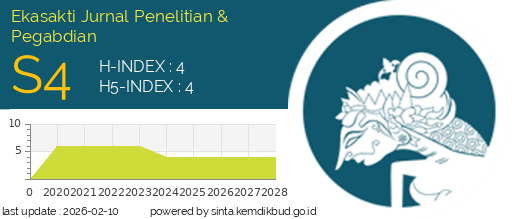TINGKAT RESILIENSI REMAJA YANG ORANG TUANYA BERCERAI
DOI:
https://doi.org/10.31933/ejpp.v4i1.1192Keywords:
Resilience, Adolescents, Parental DivorceAbstract
Resilience in adolescents experiencing parental divorce is influenced by gender and the type of divorce. Boys and girls exhibit different responses to divorce, both behaviorally and emotionally. Additionally, the type of divorce (divorce alive or divorce dead) has varying impacts on adolescent resilience. The respondents of this study were 87 adolescents selected using purposive sampling. The instrument used was a resilience questionnaire. Data were analyzed using descriptive statistical techniques and t-test analysis. The results show: (1) The overall level of resilience among adolescents is mostly in the moderate category; (2) There is a significant difference in resilience between male and female adolescents; (3) There is a significant difference in resilience between adolescents experiencing parental divorce in the case of divorce alive versus divorce dead. To support optimal resilience development, it is important for teachers, counselors, and parents to understand these dynamics and provide support that meets the individual needs of adolescents.
References
Altunda?, Y., & Bulut, S. (2014). Prediction of Resilience of Adolescents Whose Parents Are Divorced. Psychology, 5(10), 1215
Babalis, T., Tsoli, K., Nikolopoulos, V., & Maniatis, P. (2014). The Effect Of Divorce on School Performance And Behavior in Preschool Children in Greece: An Empirical Study of Teachers’ Views. Psychology, 5(01), 20.
Dewi, N. R., & Hendriani, W. (2014). Faktor Protektif untuk Mencapai Resiliensi Pada Remaja Setelah Perceraian Orang Tua. Jurnal Psikologi Kepribadian Dan Sosial, 3(3), 37- 43.
Fagan, P. F., & Churchill, A. (2012). The Effects of Divorce on Children. Marriage and Religion Research Institute, Research Synthesis - marri.us, 1-48.
Ifdil, I., & Taufik, T. 2012. Urgensi Peningkatan dan Pengembangan Resiliensi Siswa di Sumatera Barat. Jurnal Ilmiah Ilmu Pendidikan, XII(2), 115–121.
Ifdil, I., Ardi, Z., & Yendi, F. (2012). Tingkat Resiliensi Siswa SMA Negeri Pasca Bencana di Kota Padang.
Karatas, Z., & Cakar, F. S. (2011). Self-Esteem and Hopelessness, and Resiliency: An Exploratory Study of Adolescents in Turkey. International Education Study, 84-88.
Kelly, J. B., & Emery, R. E. (2003). Children's Adjustment Following Divorce: Risk and Resilience Perspectives. Family relations, 52(4), 352-362.
Reina Renita Irawan, Andi Asrina, Yusriani (2020) Pembentukan Konsep Diri Remaja (Studi Pada Remaja Korban Perceraian Orang Tua) Kota Makassar Tahun 2020, Window of Public Health Journal, 01(02), 48-58.
Reivich, Karen., & Shatte, A. 2003. The Resilience Factor: 7 Keys to Finding Your Inner Strength and Overcoming Life’s Hurdles. New York: Broadway Books.
J. W. (2011). Life-Span Development: Perkembangan Masa Hidup Jilid 1, Edisi ke-13, Alih Bahasa: Widyasinta Benedictine. Jakarta: Erlangga.
S. W. (2008). Effects of Parental Divorceon Marital Commitment and Confidence. National Institute of Health Public Access, 1-5.
Wolchik, S. A., Schenck, C. E., & Sandler, I. N. (2009). Promoting Resilience in Youth From Divorced Families: Lessons Learned From Experimental Trials of The New Beginnings Program. Journal of personality, 77(6).
Wolin, S., & Wolin, S. J. (1993). The Resilient Self: How Survivors Of Troubled Families Rise Above Adversity. New York: Villard Books.
Downloads
Published
How to Cite
Issue
Section
License
Copyright (c) 2024 Fikriyah Mardhatillah, Frischa Meivilona Yendi, Afdhal, Taufik, Miftahul Fikri

This work is licensed under a Creative Commons Attribution 4.0 International License.
Penulis yang mempublikasikan manuskripnya di jurnal ini menyetujui ketentuan berikut:
- Hak cipta pada setiap artikel adalah milik penulis.
- Penulis mengakui bahwa Ekasakti Jurnal Penelitian & Pegabdian (EJPP) berhak menjadi yang pertama menerbitkan dengan lisensi Creative Commons Attribution 4.0 International (Attribution 4.0 International (CC BY 4.0) .
- Penulis dapat mengirimkan artikel secara terpisah, mengatur distribusi non-eksklusif manuskrip yang telah diterbitkan dalam jurnal ini ke versi lain (misalnya, dikirim ke repositori institusi penulis, publikasi ke dalam buku, dll.), dengan mengakui bahwa manuskrip telah diterbitkan pertama kali di Ekasakti Jurnal Penelitian & Pegabdian (EJPP).













